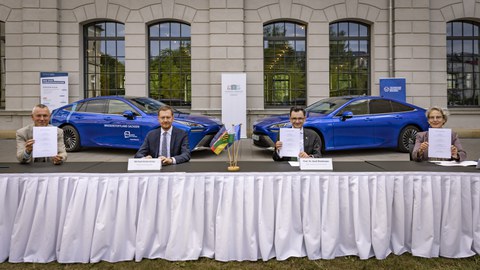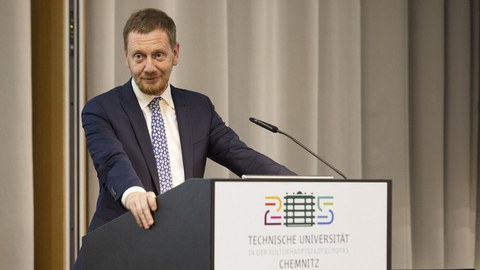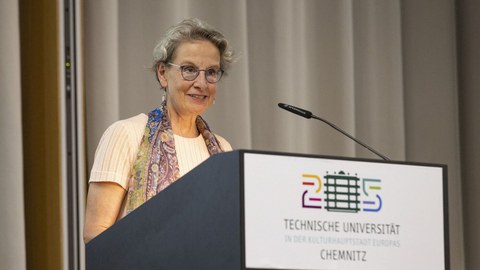Aug 10, 2022
Technical Universities in Chemnitz, Dresden and Freiberg Form Saxon Hydrogen Union

On August 10, 2022, in the presence of Saxony's Prime Minister Michael Kretschmer (2nd from left), the President of Chemnitz University of Technology, Prof. Dr. Gerd Strohmeier (2nd from right), the Rector of TU Dresden, Prof. Dr. Ursula M. Staudinger, and the Prorector for Research and Transfer of TU Freiberg, Prof. Dr. Jörg Matschullat, signed the Memorandum of Understanding to form the "Saxon Hydrogen Union".
The three technical universities of the Free State of Saxony joined forces on August 10, 2022 at Chemnitz University of Technology to form the Saxon Hydrogen Union – Saxony's Minister President Michael Kretschmer praised this merger as a major step on the way to a climate-neutral and even stronger industry in Saxony
The Chemnitz University of Technology, the Dresden University of Technology and the Freiberg University of Mining and Technology formed the Saxon Hydrogen Union on August 10, 2022. In the presence of Saxony's Minister President Michael Kretschmer, the President of Chemnitz University of Technology, Prof. Dr. Gerd Strohmeier, the President of TU Dresden, Prof. Dr. Ursula Staudinger, and the Vice President for Research and Transfer at TU Freiberg, Prof. Dr. Jörg Matschullat, signed a corresponding Memorandum of Understanding. As part of the Saxon Hydrogen Union, the three partner universities are deepening and institutionalizing their extremely valuable collaboration, particularly in the area of research along the entire hydrogen value chain. In this way, synergies will be used even better in the future to strengthen Saxony as a business and science location, to achieve joint research results on important future topics, to transfer these more quickly to industry and society, and to produce future specialists for the hydrogen economy.
Against the backdrop of climate change, the energy transition and the current fuel shortage due to the war in Ukraine, the rapid expansion of renewable energies is currently more important than ever. The three technical universities are already making a significant contribution to the hydrogen strategy of the Free State of Saxony. For example, Chemnitz University of Technology has been working for several years to develop Chemnitz into the leading location for hydrogen research. A visible expression of these efforts is the Hydrogen and Mobility Innovation Center (HIC) - a national innovation and technology center for hydrogen technologies, which will be funded by the federal government with a total of 72.5 million euros in the future and is being built on the South Technology Campus with the significant participation of Chemnitz University of Technology. In the joint project "SaxonHy", Dresden University of Technology is researching the fundamentals of hydrogen-based flying and investigating how the alternative fuel can be stored in aircraft.
Michael Kretschmer, Minister President of the Free State of Saxony: “Saxony is home to many future-oriented economic and scientific cooperations. As of today, the newly founded Hydrogen Union is also one of them and already shows that research, economic development and climate protection can and must go hand in hand. As the state government, we have set ourselves the goal of building a hydrogen economy with value chains that are as closed as possible in Saxony. The strong partnership between the three technical universities of Chemnitz, Dresden and Freiberg is a major step in this direction - it brings us a step closer to a climate-neutral and even stronger industry in Saxony. The results of their work will most certainly help to ensure that the hydrogen model region of Saxony continues to develop successfully.”
Prof. Dr. Gerd Strohmeier, President of Chemnitz University of Technology: “With the Saxon Hydrogen Union, involving the three technical universities in the Free State of Saxony, what fits together is growing together excellently. Hydrogen research, particularly research in hydrogen fuel cell technology, plays a significant role at Chemnitz University of Technology, in close cooperation with the HZwo association and the future national Hydrogen Innovation Center in Chemnitz. Together, with TU Dresden and TU Bergakademie Freiberg, we will succeed better still in addressing extremely important issues of the future and in enriching the Free State of Saxony as a location for science and business.”
Prof. Dr. Ursula M. Staudinger, Rector of TUD: “As Rector of Dresden University of Technology, I am particularly pleased that with today's signing of the „Memorandum of Understanding on the Establishment of the Saxon Hydrogen Union“, we are using existing synergies between TU Dresden, Chemnitz University of Technology and TU Bergakademie Freiberg to intensify cooperation in the context of the newly founded Saxon Hydrogen Union. Climate-friendly energy supply is fundamental for future generations. The Hydrogen economy will be an essential part of a climate-friendly energy supply. Not least for this reason, the TUD has made climate-friendly and sustainable energy research a new, broadly interdisciplinary research focus.”
Prof. Dr. Jörg Matschullat, Vice-Rector for Research and Transfer at TU Bergakademie Freiberg: "At TU Bergakademie Freiberg, ressource efficiency and conservation play a major role, especially during the tense struggle for a successful energy turnaround. In this context, numerous projects have been and are being initiated with the industry in the gas supply sector in Saxony, as well as in the processing industry. Ehe aim is to replace fossil natural gas with renewable and climate-neutral hydrogen. The Hydrogen Union bundles the competences of the Saxon universities and create a beacon for the accelerated transfer of new technologies into the economy across the federal states."
The Saxon Hydrogen Union emerged from the already active and very intensive partnership of top researchers from the three participating universities in the field of hydrogen and energy. Among them Prof. Dr. Thomas von Unwerth, head of the professorship of Advanced Powertrains at Chemnitz University of Technology, Prof. Dr. Antonio Hurtado, head of the professorship of Hydrogen and Nuclear Energy at TU Dresden, and Prof. Dr. Hartmut Krause, head of the professorship of Gas and Heat Technology at TU Bergakademie Freiberg.
Prof. Dr. Thomas von Unwerth: "I am pleased to be able to link the hydrogen research activities of my institute and colleagues at Chemnitz University of Technology with those of the other partners in order to jointly advance the broad spectrum of topics in the hydrogen value chain in an integrated and sustainable manner. With the Hydrogen Union and additional support for the connecting function of the HZwo innovation cluster and its partner network consisting of industry and other research institutions, we can succeed in expanding outstanding individual research projects into excellent transregional collaborative research."
Prof. Dr. Antonio Hurtado: “Hydrogen-based systems are an elementary component of the energy strategy of TU Dresden. In the future, we will significantly strengthen our activities in basic and application-oriented research on individual components as well as holistic systems. The production of green hydrogen requires considerable amounts of regeneratively generated electricity and thus land, raw materials and water. In the future, hydrogen should only be used intelligently where there are no more efficient options for climate protection. Identifying and exploiting existing synergies is essential in this regard, and I deeply welcome an intensification of cooperation between the three technical universities together with industry in the Free State.”
Prof. Dr. Hartmut Krause: "It is a great desire of mine to bring the hydrogen competence of TU Bergakademie Freiberg into the research network of the Saxon Hydrogen Union. The gas infrastructure plays a key role in the value chain of green hydrogen. It is important to make the existing natural gas supply with its enormous assets fit for a hydrogen supply. Important basic principles for this have already been developed in the HYPOS Initiative, such as the issues of using existing pipelines and underground gas storage facilities. The Bad Lauchstädt Energy Park real laboratory project will transfer the basic principles to the necessary scale. Together with the partners of the Hydrogen Union, we want to drive and accelerate transformation among energy consumers in industry and transportation through new, innovative technologies."
Contact:
Prof. Thomas von Unwerth
Institute of Automotive Research at Chemnitz University of Technology
Tel.: 0371 531-23550
Prof. Antonio Hurtado
Institute of Power Engineering of TU Dresden
Tel.: 0351 463-34472
Prof. Hartmut Krause
Institute of Thermal Engineering of TU Bergakademie Freiberg
Tel.: 03731 39-3941


